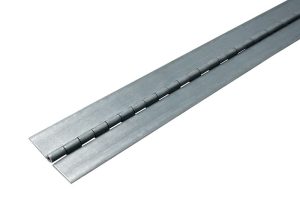
Prolonged exposure to moisture can take a toll on hinges. Moisture contains oxygen. When exposed to these oxygen molecules, hinges will experience oxidation. They will essentially gain some of the waterborne oxygen molecules, thus increasing the risk of corrosion. The good news is that electrogalvanized hinges are available to protect against oxidation-related corrosion.
The Basics of Electrogalvanization
Electrogalvanization is a finishing process that involves the application of a layer of zinc over the surface of a metal object, such as a hinge. An electric current is used to blast the zinc onto the object. The object’s underlying material will remain intact. Electrogalvanization simply adds a new layer of zinc to the object.
The electrogalvanization process typically consists of the following steps:
- The hinge is cleaned and prepared.
- The hinge is submerged in an electrolytic solution.
- An electric current is applied to the solution
- The zinc ions adhere to the hinge.
There are other galvanization processes available. In addition to electrogalvanization, for instance, there’s hot-dipped galvanization. They both involve the application of a layer of zinc. The difference is that hot-dipped galvanization uses a bath of molten zinc, whereas electrogalvanization uses an electrical current to apply the zinc layer.
Electrogalvanized Hinges Explained
Electrogalvanized hinges are mechanical bearings that have undergone the finishing process of their namesake. Piano hinges are available with electrogalvanization. Also known as continuous hinges, piano hinges are full-length hinges. They are commonly found on pianos, but piano hinges are used on many other products as well. Regardless, they are long, full-length hinges.
Electrogalvanized piano hinges are used in many of the same applications as traditional piano hinges; they’ve simply undergone electrogalvanization. They feature a thin but solid layer of zinc that protects them from corrosion.
Why Choose Electrogalvanized Hinges
With their outer layer of zinc, electrogalvanized hinges offer a superior level of protection against corrosion. Most hinges, including piano hinges, are made of steel. As an iron alloy, steel is strong, but it’s also susceptible to corrosion when exposed to moisture. Oxidation will cause the iron within steel to rust and corrode. Electrogalvanization, though, prevents this from occurring.
Zinc doesn’t succumb to corrosion — at least not in the same way as other metals like iron. It will form a protective barrier over the hinge. Rather than corroding, electrogalvanized hinges will provide a long-lasting bearing solution.
Another benefit of electrogalvanized hinges is aesthetics. While available in different styles, most of them feature a sleek and appealing finish thanks to their extra layer of zinc.
